2008-2009
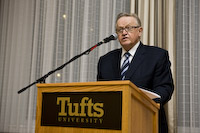 Martti Ahtisaari
Martti Ahtisaari
Martti Ahtisaari, who has served most of his career as civil servant in the Finnish Foreign Ministry and the United Nations, was President of the Republic of Finland between 1994 and 2000. Between 2000 and 2008, Mr. Ahtisaari has taken various tasks involved in peace mediation and conflict resolution. In 2003, he chaired an independent panel on the security and safety of UN personnel in Iraq. Between 2003 and 2005, he served as UN Special Envoy for the Horn of Africa. In 2005, he facilitated the peace process between the Government of Indonesia and the Free Aceh Movement. Between 2005 and 2008, Mr. Ahtisaari acted as the Special Envoy of the Secretary-General of the United Nations for the future status process for Kosovo. Mr. Ahtisaari is the laureate of the Nobel Peace Prize 2008. Mr. Ahtisaari is currently Co-Chair of European Council on Foreign Relations; Chairman of the Governing Council of Interpeace; and Chairman of the Independent Commission on Turkey, examining the challenges and opportunities presented by Turkey's possible membership in the European Union, among other positions. He is the recipient of numerous awards, including the Franklin D. Roosevelt Four Freedoms Award; the Hessen Peace Prize; the J. William Fulbright Award for International Understanding; and the US State Department's Tribute of Appreciation.Through the Crisis Management Initiative, Mr. Ahtisaari was very instrumental in the 2007 Iraq: Moving Forward initiative of the Institute for Global Leadership and the John W. McCormack Graduate School of Policy studies at UMass Boston.
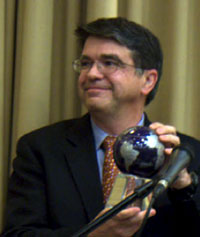
Bernard Amadei
Bernard Amadei is the Founding President of Engineers Without Borders - USA and co-founder of Engineers Without Borders - International. He is a Professor of Civil Engineering at the University of Colorado at Boulder. His main research and teaching interests have initially been in rock mechanics and engineering geology. He was recently elected a Member of the U.S. National Academy of Engineering. Professor Amadei has been extremely active in publishing papers in both scientific journals and professional meetings. He has co-authored two books and approximately 150 technical papers. Professor Amadei's current interests cover the topics of sustainability and international development. At the University of Colorado at Boulder he directs a new program in Engineering for Developing Communities.
For your breathtaking vision of the application of technical skills to humane outcomes
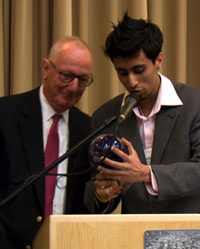
Harm de Blij
Dr. de Blij specializes in geopolitical and environmental issues and has held named chairs at Georgetown University, Marshall University, and the Colorado School of Mines. He is currently Distinguished Professor of Geography at Michigan State University, where he also taught throughout the decade of the 1960s. In the interim, he chaired the Geography Department at the University of Miami and served as editor at the National Geographic Society. In 1994, National Geographic Society President Gilbert Grosvenor appointed Dr. de Blij an Honorary Life Member of the Society. Author, professor, and television personality, Harm de Blij was the popular Geography Editor on ABC's Good Morning America for seven years. In 1996 he joined NBC News as Geography Analyst, appearing mostly on MSNBC. He was writer of and commentator for the original PBS Series The Power of Place.
For a lifetime of scholarship dedicated to engaging generations in the world
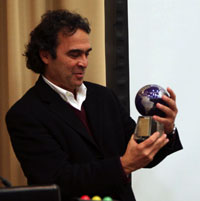 Sergio Fajardo
Sergio Fajardo
Dr. Sergio Fajardo Valderrama, a PhD in mathematics, was Mayor of Medellín, Colombia's second largest city, between 2004 and 2007. He is currently running for the presidency in 2010. His term governing the city of Medellín was marked by transparency, opportunity, and the dramatic decrease in the annual rate of homicides. He balanced the local budget, used performance-based evaluation to assign the highest staff positions for the Boards of the city, and normalized teacher recruitment for one year terms. Public opinion polls gave him an 80 percent approval rating. He was a member of the National Council on Basic Sciences, the National Commission on Masters and Doctorates, the Board of the Foundation Supporting the Universidad de Antioquia, and Director of the Center for Science and Technology in Antioquia. He also had a career as a journalist, and he was sub-director of El Colombiano and a columnist for El Mundo, El Espectador and the magazine Dinero. He worked on the television programs Operación Ciudad of Telemedellín and Zanahoria of Teleantioquia. Sergio Fajardo participated in the peace process as a founding member of the Facilitating Commission for Peace in Antioquia (Comisión Facilitadora de Paz de Antioquia) during the tenure of current President Alvaro Uribe.
For your innovative and courageous leadership in creating an open, livable city
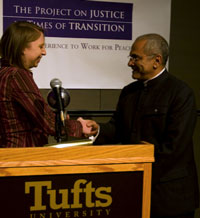 José Ramos-Horta
José Ramos-Horta
José Manuel Ramos-Horta is the second President of East Timor since independence from Indonesia, taking office on 20 May 2007. He is a co-recipient of the 1996 Nobel Peace Prize and a former Prime Minister, having served from 2006 until his inauguration as President after winning the 2007 East Timorese presidential election. As a founder and former member of the Revolutionary Front for an Independent East Timor (FRETILIN), Ramos-Horta served as the exiled spokesman for the East Timorese resistance during the years of the Indonesian occupation of East Timor (1975 to 1999). While he has continued to work with FRETILIN, Ramos-Horta resigned from the party in 1988, and has since remained an independent politician. After East Timor achieved independence in 2002, Ramos-Horta was appointed as the country's first Foreign Minister. He served in this position until his resignation on 25 June 2006, amidst political turmoil. On 26 June, following the resignation of Prime Minister Mari Alkatiri, Ramos-Horta was appointed acting Prime Minister by the President, Xanana Gusmão. Two weeks later, on 10 July 2006, he was officially sworn in as the second Prime Minister of East Timor.
In recognition of your enduring commitment to peace, courageous leadership, and humane sensibilities as a global leader.
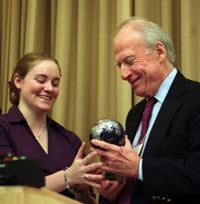 Robert Kiley
Robert Kiley
Robert R. Kiley is the former commissioner of transport for London (TfL), the executive transportation agency of the Mayor of London. Prior to that appointment in January 2001, he was president and CEO of the New York City Partnership and Chamber of Commerce. Immediately prior to joining the Partnership, Mr. Kiley served as a member of Kohlberg & Co. From 1991to 1994, he was president of the Fischbach Corporation and in 1994 became its chairman. As chairman and chief executive officer of the Metropolitan Transportation Authority from 1983 to 1990, Mr. Kiley directed the rebuilding of New York's public transportation system (MTA) and restructured its management. Prior to working at the MTA, Mr. Kiley consulted with corporations and public agencies at the Cambridge, Massachusetts-based Management Analysis Center in 1979 and was the chairman and CEO of the Massachusetts Bay Transportation Authority from 1975 to 1979. Mr. Kiley also served as Boston's deputy mayor from 1972 to 1975 and as associate director of the Police Foundation from 1970 to 1972. He is a member of the Council on Foreign Relations and vice chairman of the Citizens Committee for New York.
For your civic leadership and decisive and innovative thinking on meaningful urban policy
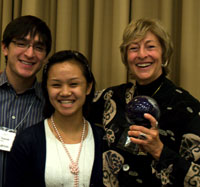 Janice Perlman
Janice Perlman
Janice Perlman is the Founder and President of The Mega-Cities Project, Inc. a global non-profit organization with consultative status to UN ECOSOC whose mission is "to shorten the lag time between ideas and implementation." The Mega-Cities strategy is to identify, document, disseminate and transfer innovative solutions to the problems cities face in common. In 1996, UN-Habitat adopted the Mega-Cities approach, methodology and innovations database in creating its "Best Practices Awards." Dr. Perlman has served as the Executive Director of Strategic Planning for the New York City Partnership, which focuses on the use of private resources for public goods. She has served as Coordinator of the Inter-Agency Task Force on neighborhoods of President Carter's National Urban Policy and Director of Science, Technology and Public Policy at the New York Academy of Sciences. She was named Visiting Scholar at the World Bank for 2004-2005. Her publications include The Myth of Marginality: Urban Politics and Poverty in Rio de Janeiro; Misconceptions about the Urban Poor and the Dynamics of Housing Policy Evolution; Grassrooting the System; the concluding chapter of the 2007 State of the World: Our Urban Future; Marginality: From Myth to Reality in the Favelas in Rio de Janeiro, 1969-2002; and FAVELA: The Dynamics of Urban Poverty in Rio de Janeiro, 1968-2005.
For your passionate and pioneering scholarship on mega-cities and your commitment to social justice
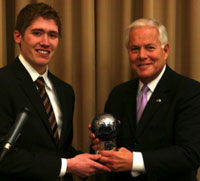 Donald Plusquellic
Donald Plusquellic
In January 2009, Don Plusquellic began his 23rd year as Mayor of the City of Akron. He is the city's longest-serving mayor. Previously, he served for 13 years on Akron City Council where he was president from 1984-1987. Fellow mayors elected Mayor Plusquellic as the 62nd President of the United States Conference of Mayors in June 2004, a bi-partisan organization representing 500 U.S. cities. He currently serves as vice president of the International Mayors for Peace organization and has been named an honorary member of the International Raoul Wallenberg Foundation. Mayor Plusquellic received the International Economic Development Council's 2008 Leadership Award for Public Service for his leadership in working to provide new revenue to re-build every one of Akron's schools as Community Learning Centers by the year 2018. American City & County Magazine named Mayor Plusquellic the nation's "Municipal Leader of the Year" in December 2003. The Wall Street Journal recognized the Mayor in a front-page article (5/16/00) on the importance of Mayoral leadership in America. In 1999, he received the highest honor bestowed on city leaders by the U.S. Conference of Mayors, the prestigious City Livability Award, for his leadership in the decade-long effort to create and develop Joint Economic Development Districts (JEDD) in Ohio.
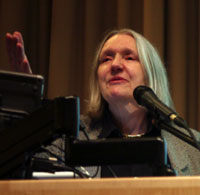 Saskia Sassen
Saskia Sassen
Saskia Sassen, Robert S. Lynd Professor of Sociology at Columbia University, focuses her research and writing on globalization (social, economic, and political), immigration, global cities (including cities and terrorism), the new networked technologies, and changes within the liberal state that result from current transnational conditions. In her research, she has focused on the counterintuitive as a way to cut through established "truths." Professor Sassen has just completed a five-year project for UNESCO on sustainable human settlement for which she set up a network of researchers and activists in over 30 countries. She edited Deciphering the Global: Its Spaces, Scales, and Subjects, a collection of her doctoral students' work. She co-edited Digital Formations: New Architectures for Global Order, based on a multi-year project sponsored by the SSRC through its Information Technology and International Cooperation Committee, which she chaired.
For a lifetime of distinguished scholarship, innovative thought and insight about the complexity and implications of urbanization and globalization
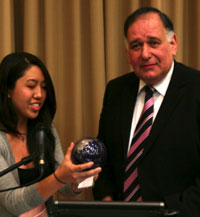 Yona Yahav
Yona Yahav
Yona Yahav is an Israeli lawyer and politician. He is currently the mayor of Haifa, Israel. He was born in Haifa during the period of the British Mandate. Mayor Yahav reached the rank of lieutenant colonel in the Military Police Corps of the Israel Defense Forces. In London, he was secretary-general of the World Union of Jewish Students. Mayor Yahav was an advisor to Minister of Transport Gad Yaacobi and the spokesman of Teddy Kollek, mayor of Jerusalem. From 1996 to 1999, he was elected to the Knesset as a member of the Labour Party and served as the chairman of the subcommittee for banking. In 2003 he was elected mayor of Haifa on a joint Shinui-Greens ticket, having already served as deputy mayor. He is also chairman of the Haifa Economic Corporation and previously chaired the Haifa International Film Festival organization and the city's theatre executive.
For your leadership, courage and moral clarity in distinguishing Haifa as a exemplar of hope in a time of conflict

